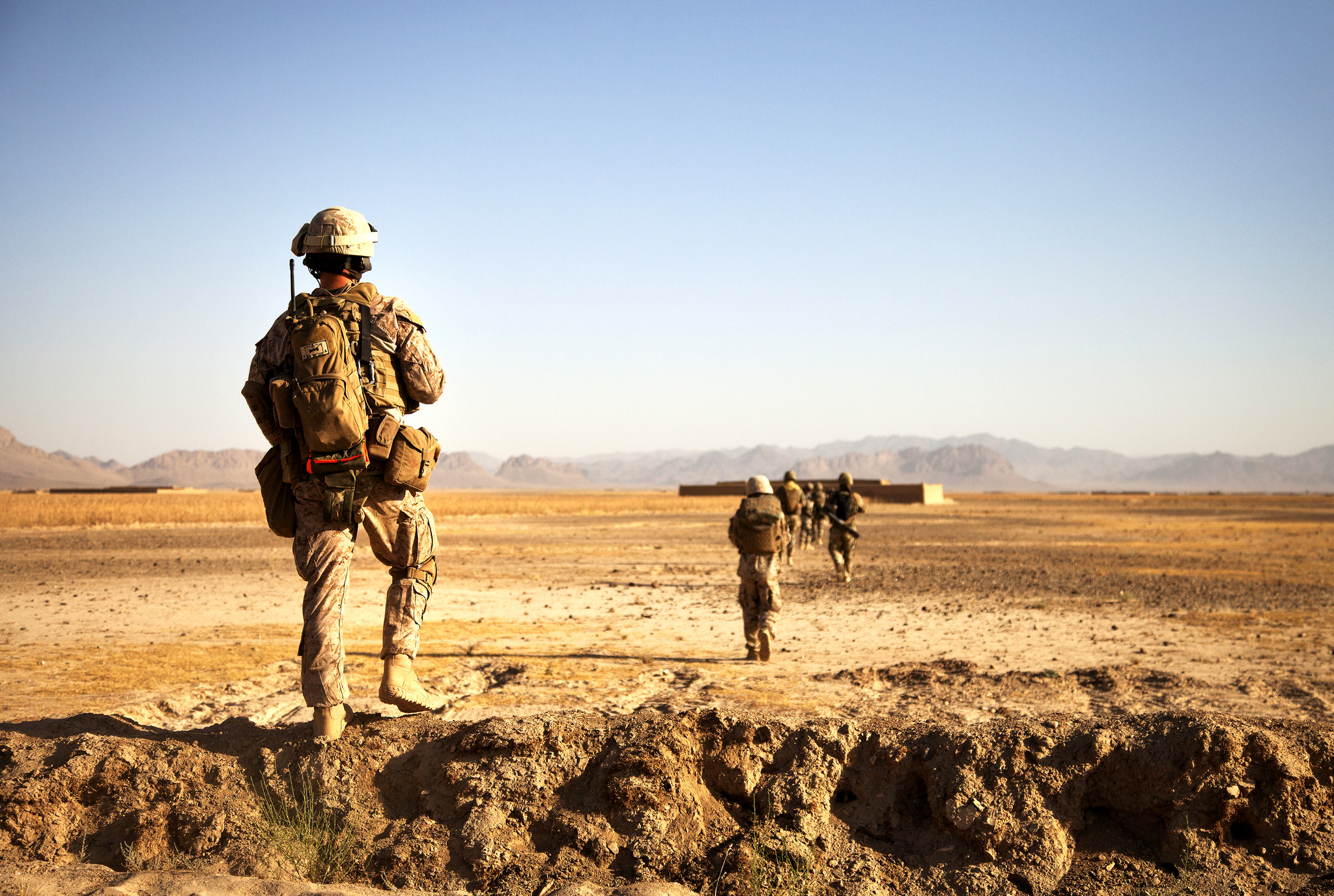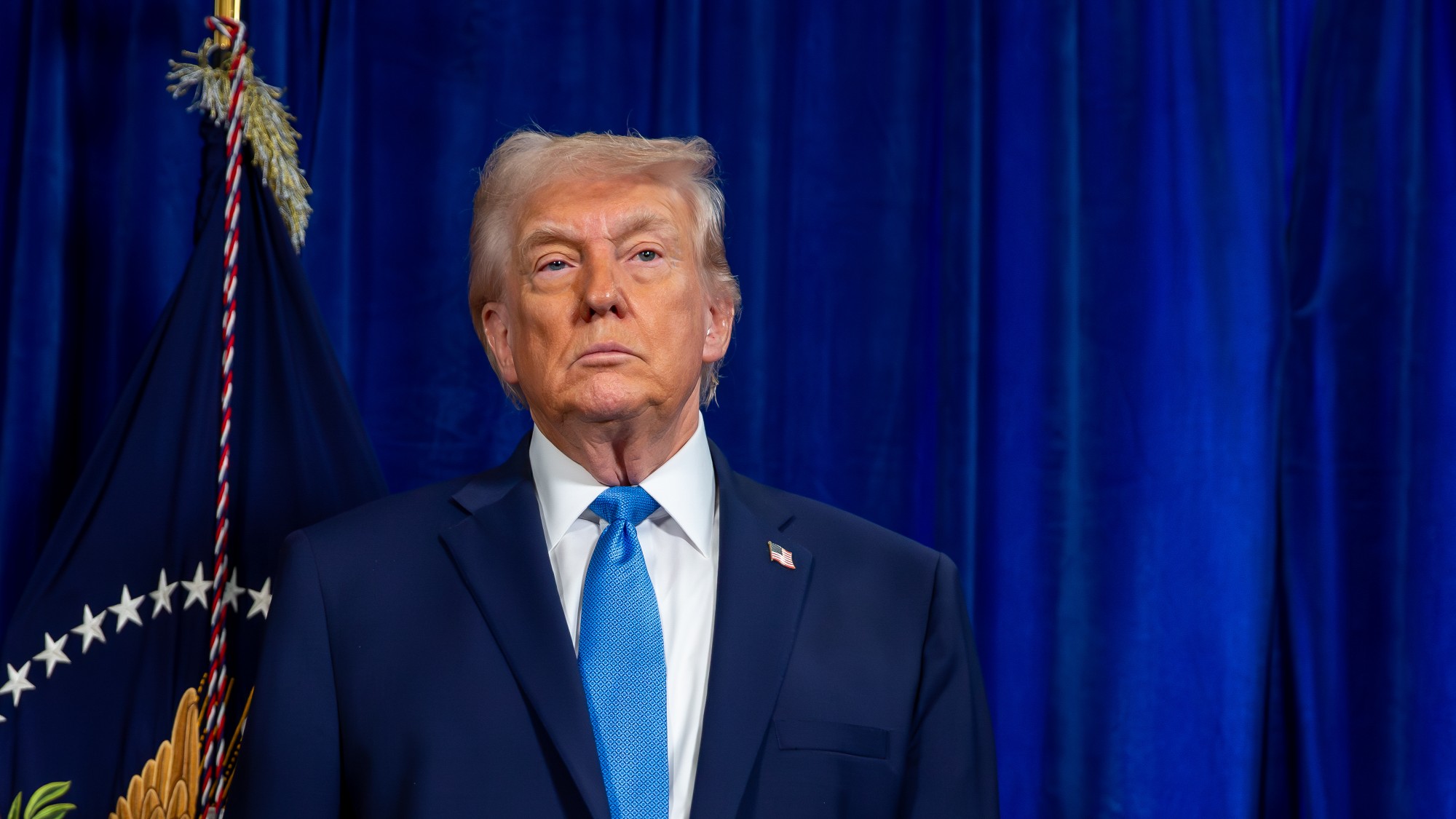The tough questions the media rarely asks the GOP's foreign policy hawks
Would you send more troops to Iraq? How about Syria? Libya? China? Nigeria?


A free daily email with the biggest news stories of the day – and the best features from TheWeek.com
You are now subscribed
Your newsletter sign-up was successful
Listening to Lindsey Graham's speech announcing his campaign for the Republican nomination, you'd think American political culture was awash in isolationism instead of thoroughly dominated by military interventionists.
Aside from the selective restraint occasionally endorsed by Rand Paul, Bernie Sanders, and Jim Webb — candidates with combined support of 23.4 percent in the polls — the presidential field is jam-packed with hawks. Bush, Walker, Rubio, Carson, Huckabee, Cruz, Christie, Perry, Kasich, Santorum, Graham, and yes, Clinton — all of them would probably prove more inclined than Barack Obama to use force. (And lest you buy into Republican nonsense about the president being a foreign policy wuss, keep in mind that he has bombed a total of eight countries since taking the oath of office — a tally that solidly beats out swaggering tough-guy George W. Bush.)
A hawkish approach to the world remains the default position in American presidential politics — so much so that journalists rarely confront pro-interventionist candidates with tough-minded questions about their thinking. With that it mind, this seems like a good time to pose just those sorts of questions to the candidates who favor keeping with or even expanding on the status quo.
The Week
Escape your echo chamber. Get the facts behind the news, plus analysis from multiple perspectives.

Sign up for The Week's Free Newsletters
From our morning news briefing to a weekly Good News Newsletter, get the best of The Week delivered directly to your inbox.
From our morning news briefing to a weekly Good News Newsletter, get the best of The Week delivered directly to your inbox.
Many hawks contend that President Obama isn't doing enough to combat the Islamic State, which has racked up some impressive victories in recent weeks. What more should the United States be doing to defeat ISIS in Iraq and Syria? Are you willing to risk greatly increasing the number of civilian casualties by ratcheting up our bombing campaign? Is there any reason to believe, 12 years after the American invasion of Iraq, that the Iraqi security forces will ever be willing and able to defeat ISIS on the ground? Would you support sending American troops to tip the balance? If not, would you support allowing Iran to do the job instead? If not, why not?
In addition to its recent advances in Iraq, ISIS has gained a foothold in Libya, which has descended into chaos since the United States intervened militarily in 2011 to help overthrow the regime of Moammar Gadhafi. Given Libya's proximity to Europe (Italy specifically), would you support renewed bombing or the deployment of American ground troops to halt ISIS's advance there? If not, what criteria are you using to distinguish the Islamic State's relative threat to American interests in Mesopotamia versus North Africa? For that matter, would you support military intervention to stop the advance of the similarly bloodthirsty Islamic group Boko Haram in Nigeria and surrounding countries of central Africa? If not, why not?
Given the chaos currently sweeping the Middle East and the role of American foreign policy in fomenting it (by overthrowing dictators in Iraq and Libya and supporting, or at least not opposing, Arab Spring revolutions in Egypt, Syria, and Yemen), should the United States continue to promote democracy in the region? Or should we favor stability? (If you deny the premise of the question and wish to maintain that democracy and stability are compatible in the Middle East, a further pair of questions: What do you think would be the outcome of a national democratic election in Saudi Arabia? Would you support a protest movement that called for holding one?)
Outside of the Middle East, many hawks are troubled by signs that China wishes to act as a regional power in East Asia. Do you believe American interests are furthered by continuing to imply that we will protect Taiwan from forcible reunification with mainland China (while continuing, formally, to deny the island's independence)? If China made moves against Taiwan, would you be willing to wage war with China to protect it? If so, how would this further American interests? If not, is it wise to continue bluffing?
A free daily email with the biggest news stories of the day – and the best features from TheWeek.com
Russia, too, appears to be testing the West's willingness to block its regional ambitions. Many hawks have implied that Obama has responded weakly to Vladimir Putin's annexation of Crimea — while also denying that they favor sending American troops to expel Russia from Eastern Ukraine and protect Western Ukraine (including the capital of Kiev). If the U.S. won't send troops, what more, specifically, should we be doing to get Putin to back down? If your proposal is to send arms to Ukraine, what should we do if (as seems likely) Russian military power still proves more powerful?
Imagine if Putin, weakened by Western sanctions and tempted to prop himself up domestically using nationalist and militaristic appeals, decided to test NATO's resolve by launching an incursion into one of the member states in the Baltics — let's say Lithuania. The NATO charter, which treats an attack on any member of the alliance as an attack on them all, would seem to commit the United States and its allies to declaring war on Russia, an act that would signal the outbreak of World War III. Sound hysterical? Consider: The non-contiguous Russian enclave of Kaliningrad lies just to the southwest of Lithuania. Any significant mobilization of NATO troops in Lithuania against Russia would almost certainly prompt Putin to attempt the defense of Kaliningrad, producing rapid escalation, with both sides possessing abundant nuclear weapons.
Regarding this scenario, would it be in America's interest to wage a conventional war — and risk a nuclear war — with Russia over Lithuania, a country of three million people located 4,500 miles from the East Coast of the United States? If so, what, specifically, is the interest served? If not, should Lithuania (and the other Baltic states) be a part of NATO at all? Which nations within NATO would you be willing to send substantial numbers of American troops to die for? Albania? Croatia? Slovenia? Slovakia? Bulgaria? Estonia? Latvia? Do you, like some hawks, think NATO should be expanded still further, committing American soldiers to fight in defense of Bosnia and Herzegovina, Georgia, Macedonia, and Montenegro? Given the European Union's considerable wealth and much greater proximity to Russia, shouldn't it be expected to form its own defensive alliance without the United States? If not, why not?
A final set of broader issues: America's foreign policy throughout much of the world, but especially in the Middle East, Asia, and Europe, seems to presume that the United States is and should remain the primary guarantor of order, projecting power and making defense promises across the globe, and viewing China's efforts to construct artificial islands in the South China Sea, Russia's decision to meddle in territory directly on its borders, and Yemen's collapse into civil war as harming America's vital interests.
Is this a reasonable way to look at the world and America's role within it? Is it sustainable? Desirable? Does it make us safer? Or more vulnerable? Are we merely bluffing on a global scale — basically daring a rising world power to call that bluff at a time of its choosing? Would it not be wiser for us to clarify precisely, and ahead of time, where we see our interests implicated and where we do not? Or are we really so terrified by the prospect of chaos, of losing (our already far from complete) control of events, that we're willing to pretend it makes sense to treat a good portion of the planet as our intimate business and responsibility?
Seventy years after the end of World War II, 24 years after the conclusion of the Cold War, it's long past time to begin asking the hard questions about America's role in the world.
Damon Linker is a senior correspondent at TheWeek.com. He is also a former contributing editor at The New Republic and the author of The Theocons and The Religious Test.
-
 Touring the vineyards of southern Bolivia
Touring the vineyards of southern BoliviaThe Week Recommends Strongly reminiscent of Andalusia, these vineyards cut deep into the country’s southwest
-
 American empire: a history of US imperial expansion
American empire: a history of US imperial expansionDonald Trump’s 21st century take on the Monroe Doctrine harks back to an earlier era of US interference in Latin America
-
 Elon Musk’s starry mega-merger
Elon Musk’s starry mega-mergerTalking Point SpaceX founder is promising investors a rocket trip to the future – and a sprawling conglomerate to boot
-
 The billionaires’ wealth tax: a catastrophe for California?
The billionaires’ wealth tax: a catastrophe for California?Talking Point Peter Thiel and Larry Page preparing to change state residency
-
 Bari Weiss’ ‘60 Minutes’ scandal is about more than one report
Bari Weiss’ ‘60 Minutes’ scandal is about more than one reportIN THE SPOTLIGHT By blocking an approved segment on a controversial prison holding US deportees in El Salvador, the editor-in-chief of CBS News has become the main story
-
 Has Zohran Mamdani shown the Democrats how to win again?
Has Zohran Mamdani shown the Democrats how to win again?Today’s Big Question New York City mayoral election touted as victory for left-wing populists but moderate centrist wins elsewhere present more complex path for Democratic Party
-
 Millions turn out for anti-Trump ‘No Kings’ rallies
Millions turn out for anti-Trump ‘No Kings’ ralliesSpeed Read An estimated 7 million people participated, 2 million more than at the first ‘No Kings’ protest in June
-
 Ghislaine Maxwell: angling for a Trump pardon
Ghislaine Maxwell: angling for a Trump pardonTalking Point Convicted sex trafficker's testimony could shed new light on president's links to Jeffrey Epstein
-
 The last words and final moments of 40 presidents
The last words and final moments of 40 presidentsThe Explainer Some are eloquent quotes worthy of the holders of the highest office in the nation, and others... aren't
-
 The JFK files: the truth at last?
The JFK files: the truth at last?In The Spotlight More than 64,000 previously classified documents relating the 1963 assassination of John F. Kennedy have been released by the Trump administration
-
 'Seriously, not literally': how should the world take Donald Trump?
'Seriously, not literally': how should the world take Donald Trump?Today's big question White House rhetoric and reality look likely to become increasingly blurred
